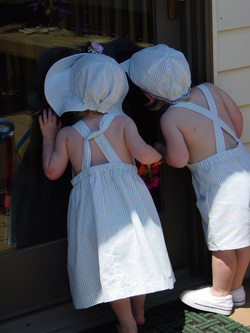Here's the link:
|
Hope today's front page feature of the Journal News helps a few people better manage the holidays and enjoy time together with family! Here's the link: http://www.lohud.com/story/life/2014/12/26/avoid-fighting-visiting-family/20906345/ I think this is a must read for everyone!
http://www.huffingtonpost.com/2013/09/04/ways-screens-are-ruining-your-familys-life_n_3860927.html8 Ways Screens Are Ruining Your Family's LifePosted: 09/04/2013 8:09 am EDT | Updated: 09/05/2013 4:27 pm EDT The link is above, the article is below: For her new book, The Big Disconnect: Protecting Childhood and FamilyRelationships in the Digital Age, Catherine Steiner-Adair EdD -- a clinical instructor in the department of psychiatry at Harvard, a school consultant, and a therapist in private practice -- interviewed more than one thousand children between the ages of 4 and 18 to find out how technology was impacting their relationships and their social and emotional lives. What Steiner-Adair discovered was neither surprising, nor comforting: Technology is becoming a kind of “co-parent;” too much screen time is impeding childhood development; and parents’ obsession with their devices is harming communication with their children and even fracturing families. Just in time for back to school, The Huffington Post asked Steiner-Adair to tell us the eight essential things parents with children of all ages need to know about screens. 1. Don’t put your baby in front of a screen. Ever. If you’re not convinced by the recommendation of the American Academy of Pediatrics, then consider this: “We don’t know yet the chemical interaction between asmartphone and a baby’s brain," says Steiner-Adair. One 2010 Danish study of 28,000 children found that exposure to cell phones before and after birth seemed to lead to an increased risk for behavioral problems. Beyond that, one of the most important skills a baby needs to learn, Steiner-Adair says, is how to calm herself down. “If you hand [a young child] a screen of any kind when they’re frustrated, you’re teaching them how not to self-soothe,” she says. “You’re handing them a stimulant. Your baby’s brain is brilliant and what it needs is good stimulation and soothing from you. You are the best app for your child.” 2. And think hard about putting your toddler in front of one, too. “A child only has from 0-5 to develop neurologically what we call the sensorium -- that’s the part of the brain where pre-literacy, kinesthetic movement, and language development happens,” says Steiner-Adair. This kind of brain development takes place through outdoor play, building, dancing, skipping, coloring -- all activities involving multi-sensory engagement. This kind of healthy engagement is basically the opposite of passively swiping a finger across a screen, says Steiner-Adair. While she acknowledges that decent games and apps exist -- Steiner-Adair directs parents toCommon Sense Media’s website for recommendations -- she insists that replacing play “IRL” with play on a screen is not what children this age need. 3. Teachers can tell if your child is getting too much screen time. Educators interviewed for Steiner-Adair’s book said that kids who spend too much time in front of screens play differently -- and less creatively -- than other children. Those who act out “Mario Brothers” or “Angry Birds” in the school yard aren’t tapping into their capacity to create their own narratives, says Steiner-Adair. “Instead of saying ‘look how high I can go’ when they’re on the swings, they say ‘look, I got to the next level!’” she says. Teachers also told the author that students who play a lot of video games don’t seem to have as much patience to sit still in the classroom, especially when they are being read to. “The capacity for attention doesn’t develop as well when kids are used to interacting with a screen that’s instantly gratifying, instantly stimulating, and provides them what the answers for the next level,” says Steiner-Adair. 4. Your kids hate your screens. Steiner-Adair says that what came up again and again during her interviews with hundreds of kids was how frustrated, sad and angry they were about having to compete with screens for their parents’ attention. “Children hate it when their parents pick them up and are on their phones and don’t even turn to say, ‘Hi honey, how was your day?’ Instead they’re giving them the shhh one minute signal which basically says ‘you’re not as important to me as whoever this other person on the phone is.’ Car rides to and from school as well as dinner, bath and reading time -- parents should be present and phone-free for all of these daily rituals, she says. “Kids do not need our undivided attention all day long, but they do in those real-life moments of talking and reading and doing the hard work of parenting -- dealing with meltdowns, teaching them how to pick up their clothes.” The bottom line: If you think your kids don’t notice that you’re distracted, you’re deluding yourself. One of Steiner-Adair’s subjects told her, “I miss the olden days when families were more important.” 5. Just because we can be connected to work 24/7 doesn’t mean we shouldbe. Many parents argue that part of why they’re plugged in during family time is because they feel they have to be available to their employers. “You either sacrifice being a good mother or father and the very limited time you have to raise your children -- or you sacrifice and risk your job to support your ability to live,” says Steiner-Adair. “This is not healthy for anybody and it’s a no-win choice.” Being constantly on call or being afraid of missing something if you don’t check your work email means you’re preoccupied and stressed when you should be enjoying your family. Steiner-Adair says that if the modern workplace is ever going to change, parents must ask employers for modulated schedules and speak up about their need to unplug. 6. Screens aren’t good for your marriage. And that’s not good for your kids. Steiner-Adair asks parents to answer this question honestly: “First thing in the morning, do you roll over in bed and look at your phone and scroll through it -- or do you roll over and cuddle your partner?” Kids are acutely aware of their parents’ disengagement from each other. In her interviews with children, many spoke to Steiner-Adair about their parents’ constant bickering over screen rules (such as no phones at the table) and said that they view their parents as hypocrites when they see them flouting the family guidelines they’ve set up. “Kids see parents talking to each other about something important and then one of them answers a call mid-conversation,” she says. “One parent has dropped the other parent. What does it say to kids about how we connect to the people we love the most?” 7. In order to be a good parent, you need to take care of yourself. “Adults use screens the same way kids do -- to avoid interaction and to avoid relying on our own inner resources," says Steiner-Adair. Increasingly when parents have a few minutes to recharge they are using that time to browse Facebook, send texts, etc. “It’s so much easier than picking up a magazine or putting your feet up on the couch and having a mini moment of relaxation -- or going for a walk and getting some fresh air-- all these things that we know actually make us feel better.” Some parents may feel that browsing Instagram or scanning the news is actually a calming way to take a break, but Steiner-Adair is skeptical. “Checking your email is not relaxing,” she says. ”Holding a tiny little hand held screen is not visually relaxing.” 8. Sorry, but you really don’t know what your kids are doing online. But that doesn’t mean you should give up trying. Steiner-Adair points to a June 2013 McAfee study, “Digital Deception: Exploring the Online Disconnect Between Parents and Kids,” as evidence that parents are often clueless about what their kids are doing online -- and says that their ignorance is seriously harming their kids. Among the study’s findings: 80 percent of parents don’t know how to check up on what their kids are doing online. Not only that, 74 percent “simply admit defeat and claim that they do not have the time or energy to keep up with their children and hope for the best,” according to the study’s authors. But Steiner-Adair says defeat is not an option when you consider all of the damaging content kids can easily stumble upon online. While interviewing kids for her book, Steiner-Adair says, several teen boys asked her questions about sexual scenes they’d seen online. “They would say, ‘can you help me understand why a woman would want to be choked while having sex? Why would she want to be peed on?’” Indeed, the McAfee study found that over 57 percent of 13-23 year olds use the Internet to search sexual topics while only 13 percent of parents believe they do. But Steiner-Adair sees hope in at least one of the McAfee stats: Nearly half of the teens surveyed said they would change their online behavior if they knew their parents were watching. “This means we can have an impact,” Steiner-Adair says. In addition to making sure that all computer use is done in a public place in the home, Steiner-Adair recommends that parents and kids sign an agreement that clearly states acceptable and unacceptable online behavior – and post it prominently. “The reason you’re supposed to sign it and post it is to remind kids, but also so that when other kids come over it makes it easier for your child to say, ‘oh no, I’ll get in too much trouble if I go to that site. See, I have the worst parents in the word," Steiner-Adair says. “That’s what you want your kids to say. You want to be that worst parent in the world.”  As I peak into the start of summer, I'm thinking about lots of things. Most of them are fun things. Summer means special fun to me! How about to you? What comes to mind when you think, "Heh, it's the end of June, summer has started!?" Kids are home, routines are different, the weather is finally nice, vacations are on the way or even started. It's good to have some plans to look forward to. Part of the satisfaction of a vacation is getting it all planned. Once things are planned, we can look forward to them! So, get some plans on your calendar! It doesn't have to be elaborate, there are plenty of things right here in our area that are great fun, and even, free! Like Jazz concerts at Lyndhurst Castle out on the big lawn with the sun setting over the Hudson River, Library reading clubs for kids and adults with prizes and picnics at local parks with friends. Here in Westchester, our lives can get pretty hectic. That isn't always good for us. Take time this summer to focus on relaxing and kicking back some. Spend time with those you love, extra time. And, make it good; choose to enjoy each other and focus on the good stuff. Don't sweat the small stuff. If you mess up on that one day, try to make the next day better. I like to remind myself each morning; the sunrise is new today, and today I get a new day, a fresh start. And then, I try to make it a good day, even, a great day. Enjoy the satisfactions of a sweet summer! I took a little drive around town last night en route to the library. Saw lots of people walking purposely from the train, a few joggers and a couple of dog walkers. I also saw blue hydrangeas in bloom, green grass, and climbing ivy. No vegetable gardens in sight though, at least not from my car window.
I was on the lookout for such gardens after seeing patriotic posters at an art museum recently. These posters featured vegetables. That’s right, vegetables. No guns in sight. They sprouted patriotic statements like, “Sow the Seeds of Victory: Plant and Raise Your Own Vegetables,” “Dig on For Victory” and “Uncle Sam Says Garden.” Vegetables aren’t the usual image we have when patriotism stirs our hearts nowadays. I doubt if any of us thought of red, white or blue veggies on the Fourth! No, it was more likely fireworks, paradesand summertime classics at the Philharmonic that were on our minds. But vegetables and gardens were very much on people’s minds during WWI. Farmers had left their fields to become soldiers, and food became scarce. Ration cards were used to limit certain items. When you were out of your allotted eggs, milk or meat, you had to wait until the next week to be allowed to get more. It was a tough time. It was tough on families and soldiers too. Everyone needs to eat whether it’s wartime, or not. Charles Lathrop Pack did some outside-the-box thinking in March 1917 and seeded a whole new idea to the American public. Grow a Victory Garden at home! Use your yards, empty lots in your cities, and even on your rooftops (now known to be a very green way to lower electrical costs.) The idea worked. The National War Garden Commission was created. Local initiatives to grow your own food sprouted up all around America. Men, women and children, even those who had never handled a small vegetable seed, shoveled away excuses and learned to grow their own food. It’s estimated that 20 million victory gardens were planted. Eleanor Roosevelt planted one on the White House lawn. Even agri-business, to the surprise of many, jumped on board promoting community gardening and food production. The U.S. Department of Agriculture estimates that the vegetables and fruit harvested in the Victory Gardens were an amount equal to all commercial production of vegetables—about 9-10 million tons. Think of it! Victory gardens, a by the people for the people initiative, worked. Health,y fresh food was more available for civilians and soldiers alike. The backyard farm-to-table initiative worked in other ways too.
You can get it ready-made, cook it yourself, eat out, or have it delivered. It’s easy to get. Just stop byDeCicco or Lange's, both a few steps from the train on the way home, run to Shop Rite or try the new HMart and bring home incredible food sure to please even the pickiest of kids. It's like this in many parts of America. But, despite the wide availability of food we have, Victory Gardens are making resurgence in America. The reasons for their renewed popularity isn’t from promotional posters or wartime scarcity. I think they’re back because of those other pluses, the ones about health improvements, emotional well-being, family values, and community. It’s all good stuff to nurture. All stuff that benefits individuals, families, and communities, like our own. Heck, on a small scale, it even benefits America. Growing a Victory Garden was called being patriotic in 1917. I think it can still be called that in 2012. I’ll attest to the value of a Victory type garden from my own experience. For the past three years I’ve been one of the adult helpers at the children’s garden at Greenville Community Church. It’s a small plot. It doesn’t even get full sun. But, our “Garden of Eat’in” is not about quantity, it’s about the shared multi-generational experience, learning together, and appreciating the wonderful world of nature. It’s really cool to watch kids who earlier would gag on eating a vegetable, eagerly pop a sugar snap pea, skin and all, into their mouth and smile big. Or, proudly walk around carrying a basket of yellow tomatoes to share with others. If you have a small piece of soil, or even just a simple container, you can produce a Victory Garden. And, don’t worry, it isn’t about quantity. Living here, you can still buy all the food you want in addition to what your garden produces. You can start with one tomato plant. Or whatever your favorite vegetable is. Plant a fruit tree. Or raspberries. Create the garden with your kids. Talk about sharing one with your next door neighbor, or your faith community. Tend some herbs on a sunny windowsill. It might take fertilization of your resourcefulness to get started, but remember those who did it before, all the way back to WWI. They didn't know what they were doing. But they plowed ahead and did it anyway. And, it worked. Why not grow your patriotism this July in a new way and start a Victory Garden? It’ll be a win-win. http://scarsdale.patch.com/articles/patriotic-vegetables Did you see them? They were quite a show-stopper, rolling around Scarsdale last week. It’s not that unusual around here to see a family with small children biking together, especially on Bicycle Sundays when the Bronx River Parkway is devoted to bikers and walkers instead of cars. But seeing a family of four who are spending a whole year traveling by bike certainly is unusual. I hope you were one of the lucky ones who got to meet Heidi and Reuben VanderKwaak and their two small children, Eden and Harper, during their recent stay in Scarsdale.
This unique family has been traveling self-contained by bike for the last 11 months. They've toured all around North America and Central America. When they rolled into Scarsdale they’d ridden over 12,000 kilometers from Ontario to Washington, down the entire west coast and into Central America all the way to Panama. Now they are headed up the East coast for their last month of biking before returning home to Hamilton, Ontario. Daughter Eden, who turned five the day the family arrived in our community, was able to name all the countries she’d been to and link them to the various country flags sprouting from the back of their bike trailer. Their caravan includes two bikes ridden by the grownups, each packed with waterproof panniers holding camping equipment, a few sets of clothing, cooking supplies, and other needed bike items. Oh, and toys, lots of lightweight toys! The children have the choice of riding behind Dad on a double set of child seats, or riding behind Mom’s bike in a twin trailer. Reuben fondly called the trailer “the kids' playroom” when the family gave a presentation on their trip to the Greenville Church Nursery School students. Maybe the idea of doing something like a year long bike ride with two small children sounds impossible to you. Maybe it sounds exciting. However it sounds, know this: this pedal-powered family is having a great time. They’re calling it adventurous simple living. For them, it’s about strengthening relationships with family, friends, and even strangers along the way. They are focusing on living in the now and living more fully in line with their life values. You can read lots more about them and their big adventure on their website www.PedalPoweredFamily.com It’s not for everyone, but it sure is for them. I have to say, they inspired me. I had the pleasure of hosting them during their stay. I'm proud to say, I'm related to them. The visit gave me time to pick their brains and hearts about their goals, their fears, and things they had learned during the year. I got to talk to the kids as well as the parents. I also had the chance to ride along with them for about 25 miles during the Five Borough Ride. I watched how they do it. I was impressed. I was inspired by the close bond I saw between them. They are amazingly connected as a family. I was inspired by their delight in simple living. They dared to dream outside the box, and they are satisfied. They aren’t longing for bigger and better. Pretty refreshing. I was inspired by their resilience and flexibility. The year’s experiences have required fortitude and dedication. I was inspired by their parenting. Both parents know the kids inside out and respect and love them in intense ways. I was inspired by the kids. They are pretty darn cool, both of them. What they are doing is pretty far out. Off the grid of daily life as we know it in Scarsdale. Not something everyone can do, or wants to do. Actually, I was inspired by that too. When's the last time you bucked the system and followed your heart in ways that were different? When's the last time you jumped in with both feet to do something that you really wanted to do but involved risk and the unknown? It seems to me they are making do with less, yet having more. Maybe they’ll inspire you too. http://scarsdale.patch.com/articles/e-motion-becoming-a-new-parent Recently, while traveling, I had the joy of visiting a fully pregnant relative. She was so close to delivery, I wondered if I might be called on to assist in an emergency home birth. “Come on now,” you might ask, “What do you mean, fully pregnant? Pregnant is pregnant.” Yes, you’re technically right, but have you seen a woman about to deliver up close and personal recently? There needs to be some adjective to describe that stage of pregnancy! I happen to think pregnancy is an amazing and beautiful time for a woman, and, hopefully, for a couple. When else is growing larger filled with such joy and anticipation? The changes in one’s body as a child grow inside border on miraculous. It’s not only a huge change for the body; it’s a also huge change for relationships. And it comes at a time when hormones are flitting all over the place, adding what seems some days to be lighter fluid to the mix. The unexpected ups and downs with twists can be like the Soaring Eagle roller coaster at Coney Island, only they last longer than 48 seconds. Try 40 weeks! And then, it’s over. You are no longer pregnant. Instead, you are a parent. For the rest of your life. The changes you’ll face go on and on, and on and on. A couple often gets a lot of help during late pregnany, and soon after, the baby is born. There are baby showers, baby books and offers of food. That’s all good. The amount of stuff needed for a baby these days far outweighs the little one’s birth weight! But what about the help needed for the other stuff? The emotional and relationship stuff we don’t talk about as much? There are challenges for the Mom-to-be, and for the Dad-to-be. Single parents have additional emotional challenges. And let’s not forget the changes and challenges for any siblings, too. There are many questions and concerns that can arise. For example: · I’m really excited we’re having a baby…Too bad my partner isn’t. · I wonder how my husband can still be attracted to me as I get so big…Is he looking elsewhere? · What if something terrible happens during the birth? What if I don’t like being a parent? What if I'm not a good parent? · How will we manage to have our special couple relationship when there are three of us? · Sleepless nights are driving me insane. Really, I wonder if I’m losing it. · This baby is darling, but I’m feeling resentful to have so much extra work and responsibility. · My in-laws have a different sense of how to parent; I don’t know how to deal with them. · We love the baby, but big sister seems to be having some troubles. What should we do? · Now I know the “Baby Blues” are for real. This is serious. And my partner doesn’t get it. These type of concerns and difficulties are common. Thinking about them is one thing. Talking about them is another. It can be pretty uncomfortable. Uncomfortable enough many avoid it. Sometimes, new parents don’t feel like they should be asking questions that indicate anything less than total excitement over the impending birth or newborn child. They can be concerned that bringing something up and talking about it honestly might result in the very thing they fear coming true or getting worse. I’m always glad when couples raise these types of questions with me in counseling. You see, the truth is, talking about something honestly in a committed relationship is usually a good idea. Talking about things that worry us can lower our fears. Talking about concerns can help us navigate the twists and turns ahead. Talking about things can free us from stress that eats away at our insides. Talking about things can help us come up with good ideas to problem solve. Talking about things with a loved one can deepen the relationship. Positive support and good communication are vital components for a healthy pregnancy and successful adjustment to living with a newborn. Many expectant parents today are not living near close relatives who could offer support. Many new moms and dads have no experience caring for an infant. Many dads wonder about how to be supportive enough to their partner. Many feel isolated and unprepared to meet the challenges ahead. Many could benefit from extra support and a safe place to talk about concerns. Midwives, doctors and nurses are all good people to raise emotional type questions with. But there's another category of helpers that can provide focused help on just such issues — counselors. Family/couple counselors are uniquely poised to help expectant couples prepare themselves for the big relationship changes going on and the ones that lie ahead. Counseling isn’t just for when you are facing severe problems. It can also be appropriate for when you are facing one of life’s transitions, like the birth of a child. I’m glad our region has many capable counselors, because almost every expectant couple could benefit from a few sessions geared around how best to keep a healthy family during the changes pregnancy and birth bring. Sometimes, in addition to normal changes, there are larger concerns, like depression or high anxiety. We know these can impact not only the health of the mom, but the well-being of the baby as well. It’s especially important to seek help if there are larger concerns. So, here’s a creative idea for a baby gift for a couple you admire. Why not give them a gift certificate for a few sessions of counseling? Expectant parents could give this to each other as well. It might end up being the longest lasting gift received. Oh, in case you are wondering, I’m a proud Auntie to a darling new nephew born two days after my visit! I can’t wait to go back and meet him. Reprinted from Scarsdale Patch weekly column
E-motion by Tamera Schreur http://scarsdale.patch.com/articles/e-motion-too-much-exposure Have you been feeling extra stressed this week? Maybe it’s not connected to your job, personal life or family issues. Maybe your exposure count is too high. We are naturally drawn to television news when disaster strikes. It is hard to turn off the vivid images of death and destruction being played over and over. There’s almost an addictive quality to it, don’t you think? Bigger screens and the advent of high definition televisions make this even truer. It's almost like being at the scene. This week, we are bombarded with images from Japan. It’s a three-fold disaster, including an earthquake, a tsunami and nuclear plant explosions. It is a horrific tragedy, and many in our area have close connections to the region. I encourage you to take the opportunity to reach out and help. This is also an opportunity to get informed about another threat, one far less severe than what is happening in Japan, but significant all the same. This threat is of particular concern to our children, even though we live far from Japan. What I’m talking about is the danger of overdosing on television news. Maybe that sounds like a strange or even silly concern to you. But stay with me a few minutes and consider this: is there such a thing as too much indirect exposure to a crisis? Simply put, the answer is YES. Current television news is unparalleled in immediacy and scope. The whole world comes close to us through TV. In America, we invite it into the most private rooms of our homes. And we welcome it in great amounts. Count the televisions you have in your household. Count the number of people that live in your home. Which number is higher? And now, with internet video and smart phones, we can be continuously immersed in news reports. According to expert Jessica Hamblen, PhD, and the Dart Center for Journalism and Trauma report, “Research generally finds an association between watching media coverage of traumatic events and stress symptoms.” Too much exposure to graphic images of disaster and death can be linked to stress symptoms. These include feelings of helplessness, anxiety, trouble sleeping, and physical symptoms like stomachaches or headaches, increased irritability and more. We can become caught in a cycle of helplessness, fear and worry. Will it happen here? Will I be hurt? Will my family be separated or injured? Indirect exposure of a disaster (watching it on television) can leave scars and interfere with normal life. Go back with me to 9/11. It’s almost ten years past, but still very fresh. I did not see the Twin Towers fall with my own eyes, and I would think few of you did either. Or did we? If I wasn’t there, why can I close my eyes and vividly “see” the second plane hit and “see” the towers implode into massive clouds of dust? Can you do the same? How about your kids, if they are old enough? It’s because we saw it over and over again on the television. Many children in my counseling practice showed signs of significant anxiety and stress for months and even years following the attacks. Even now, in 2011, people have flashbacks. People with pre-existing anxiety issues, young children, and those who have experienced a similar trauma in the past are most vulnerable to being negatively impacted. Stress can be raised to a dangerous level. I like this simple quote from Esther Sternberg, MD, a leading stress researcher and the chief of neuroendocrine immunology and behavior at the National Institute of Mental Health, “Like email and email spam, a little stress is good but too much is bad; you'll need to shut down and reboot…" You can put some things in place to keep exposure levels safe in your household.
Reprinted from Scarsdale Patch weekly E-motion article by Tamera Schreur
http://scarsdale.patch.com/articles/shared-meals-shared-lives-the-importance-of-family-dinner Worried about your child's grades? Want to do something to keep your teen on track and out of trouble? Take a look at one simple act that can make a profound difference. Lots of families have increased time together this week during Winter Recess. Perhaps your family is enjoying a winter get away to the beach (that’s where I would go!) or to the ski slopes. Have you had some nice time to sit together around a table for a meal and conversation? If so, you’re doing a good thing. Perhaps even a better thing than you realize! Family meals matter. As far back as 50 years ago, researchers looked at the results of family routines, such as family meals, for children’s well-being. Prominent institutions like Syracuse University, Georgetown and Harvard have come out citing the benefits of having regular family times together around a table of food. Even our first president’s diaries describe the good cheer produced from shared mealtimes. More recently, we’ve seen some excellent books that bring together the research with the practical applications we need to make it work for our overtaxed American families. Here’s an appetizing sampler of quotes from some of today’s family meal spokespersons:
I don’t think liking is the problem. We go to great lengths to give our children opportunities and advantages. This research shows very likable advantages. It’s the doing that gets in the way. How come? Well, our lives have gotten busy and complicated. Most parents, and even teens, are often tired. Oh, and have you ever had an unpleasant family meal when the baby is crying, the toddler got hungry hours before, the school age kids don’t like what you serve, or the teen, well, the teen would rather stay upstairs with the computer and phone? It’s not exactly something that encourages trying again. Okay, the goal here isn’t to make you feel guilty. That is rarely helpful in producing change. Plenty of parents have seen this research, feel a little or a lot of guilt, try to make changes, find the challenge too hard, and go back to life as usual with meals on the run and everyone scattered according to their diverse work and activity schedule. But change is possible. And worth it! Here are my practical tips:
“Families are people who nourish each other, spend time together [and] care about each other travel together through time. We need to eat several times a day. Linking that need with being together is a simple, direct way to strengthen our ties with our loved ones…Family life is rarely perfect, but some things can be pretty darn good. Sharing conversation and food with those we care about can be one of life's continuing joys.” |
AuthorMusings on life and relationships from Archives
February 2020
Categories
All
|






 RSS Feed
RSS Feed